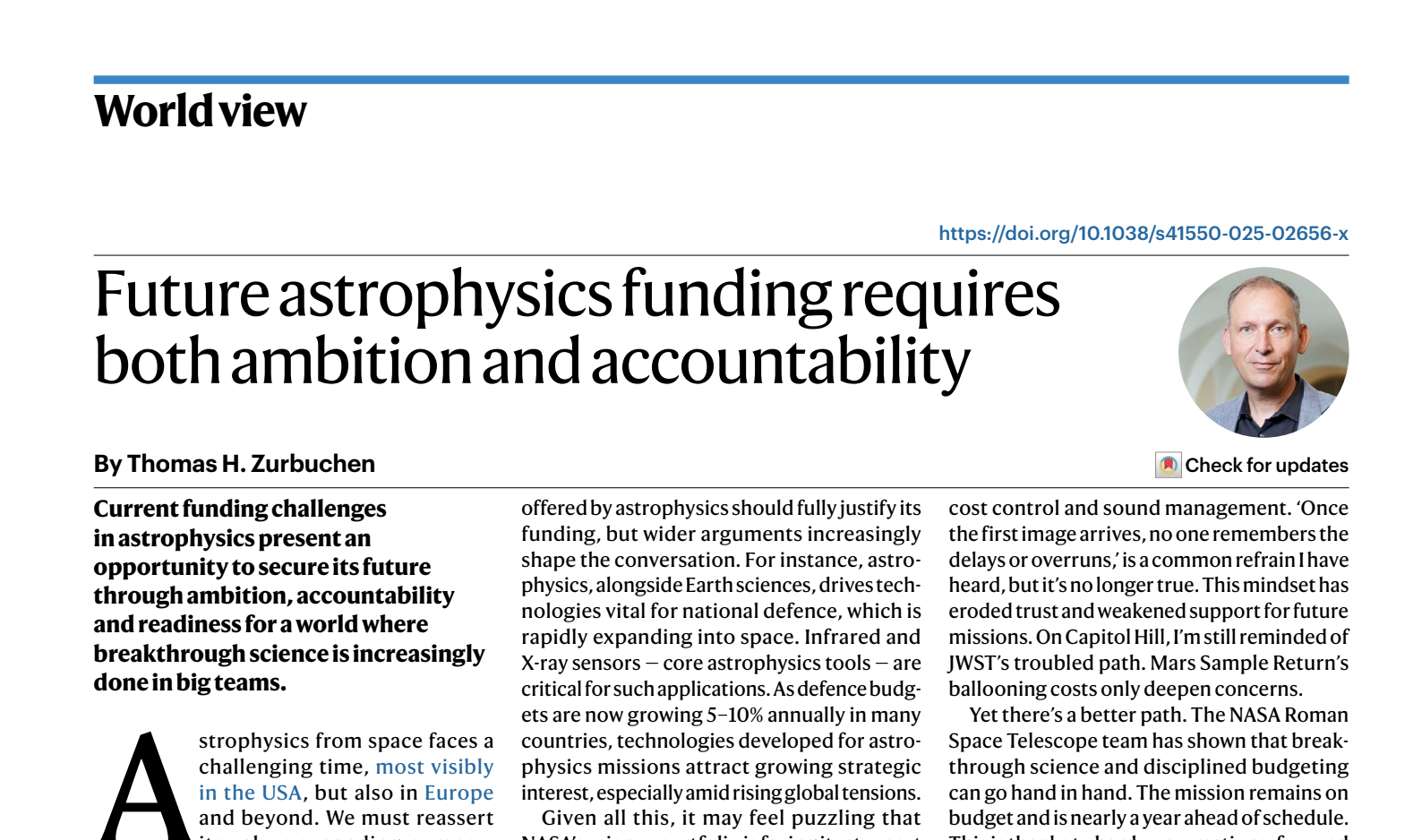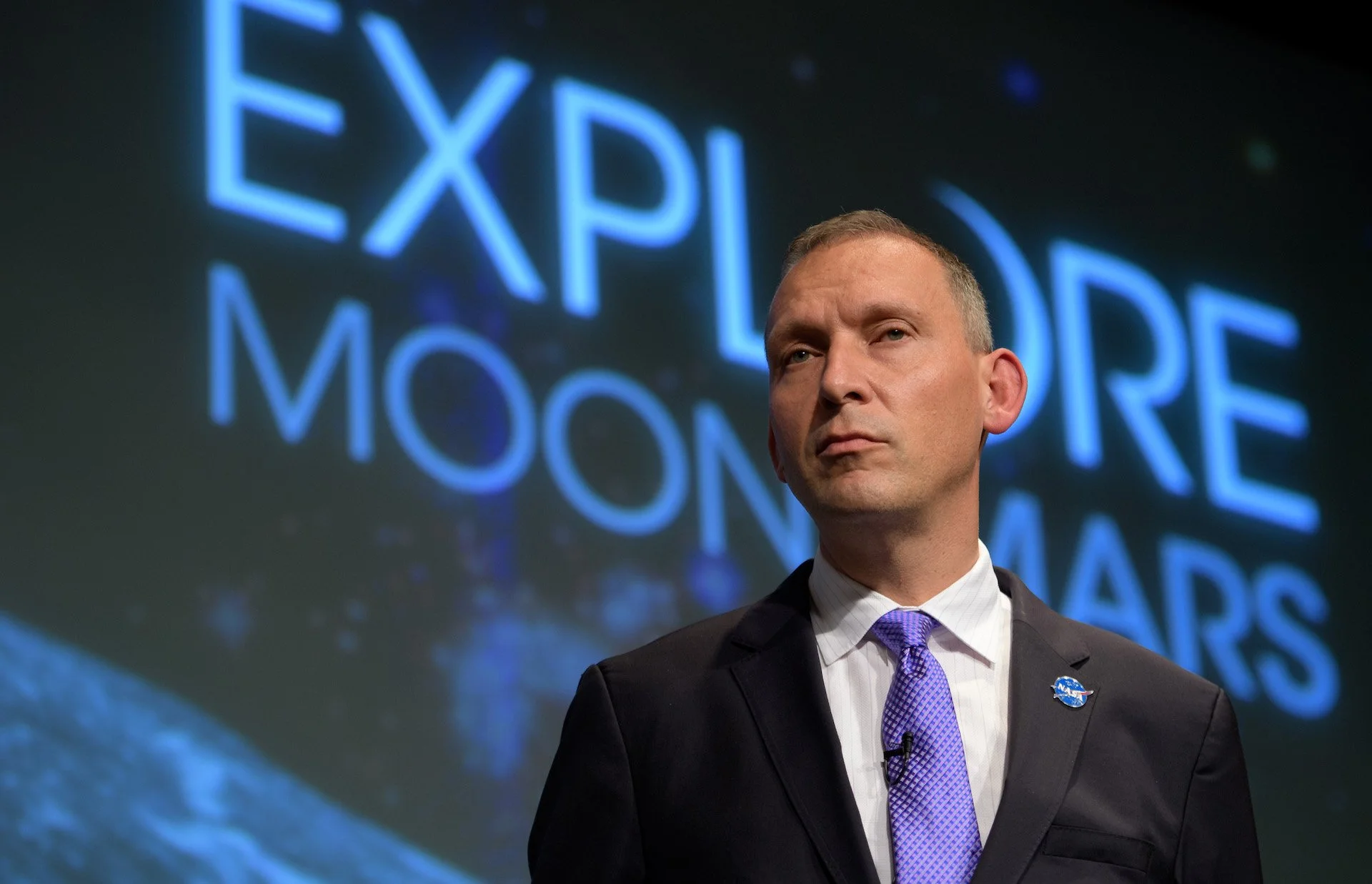Dr. Z’s Blog
-
October 2025
- Oct 15, 2025 Thomas Zurbuchen to receive Stratton Prize 2025 Oct 15, 2025
-
September 2025
- Sep 13, 2025 Future astrophysics funding requires both ambition and accountability Sep 13, 2025
-
July 2025
- Jul 23, 2025 AIAA Award for space researcher Thomas Zurbuchen Jul 23, 2025
-
April 2025
- Apr 9, 2025 DLGR Interview: Bedeutung Europäischer Raumfahrtforschung Apr 9, 2025
-
March 2025
- Mar 26, 2025 Weltwach Episode 401, Podcast German Mar 26, 2025
- Mar 22, 2025 Weltwach Episode 400, Podcast German Mar 22, 2025
-
January 2025
- Jan 17, 2025 Zäme im Zäntrum - PlattformJ Interview Jan 17, 2025
-
December 2024
- Dec 23, 2024 A Journey to Hell in the Name of Science - Washington Post Dec 23, 2024
- Dec 17, 2024 Why We Need Space Exploration Dec 17, 2024
-
November 2024
- Nov 25, 2024 Nau: Thomas Zurbuchen Ist Oberzibelegring 2024/25 Nov 25, 2024
- Nov 22, 2024 NZZ: Welchen Einfluss hat Musk auf die Amerikanische Raumfahrtpolitik? Nov 22, 2024
-
October 2024
- Oct 25, 2024 NZZ: Was Bedeutet das Grösste Raumschiff Aller Zeiten? Oct 25, 2024
- Oct 24, 2024 New Podcast: Off-Nominal Oct 24, 2024
- Oct 5, 2024 Schweizer Illustrierte: Bereit für den Neustart Oct 5, 2024
- Oct 1, 2024 Why Do We Go Back To The Moon? - Scientific American Oct 1, 2024
-
September 2024
- Sep 16, 2024 SRF: «Weltraum gehört leider zu künftigem Krieg» Sep 16, 2024
-
August 2024
- Aug 2, 2024 On VIPER and When to Cancel Missions - Scientific American Aug 2, 2024
-
April 2024
- Apr 30, 2024 Wirtschaftswoche: „Ich musste die Handgranate auf den Tisch legen“ Apr 30, 2024
-
March 2024
- Mar 15, 2024 Sciena: "I'm here to learn, to make things happen" Mar 15, 2024
- Mar 4, 2024 SRF: «Ich weiss, wie es ist, ganz allein zu sein» Mar 4, 2024
-
February 2024
- Feb 19, 2024 Innovation during difficult times Feb 19, 2024
- Feb 19, 2024 ETHz: Die Schweiz muss ihr Innovationspotenzial besser ausschöpfen Feb 19, 2024
- Feb 7, 2024 Sage Innovators Matter Feb 7, 2024
-
January 2024
- Jan 25, 2024 New Podcast: Swisspreneur Jan 25, 2024
- Jan 8, 2024 National Geographic: Historic Moon Lander Malfunctions After Launch Jan 8, 2024
- December 2023
-
May 2023
- May 25, 2023 The Next Step – Across the Atlantic, as an Immigrant May 25, 2023
-
March 2023
- Mar 20, 2023 Supporting Others While Leading Mar 20, 2023
-
January 2023
- Jan 19, 2023 Charting a New Path Jan 19, 2023
-
December 2022
- Dec 20, 2022 Why I’m leaving NASA and the job I’ve loved most Dec 20, 2022
-
November 2022
- Nov 29, 2022 Countdowns Nov 29, 2022
- Nov 9, 2022 Upcoming JPSS-2 and LOFTID Launch Nov 9, 2022
-
October 2022
- Oct 11, 2022 Congratulations to the Nobel Prize Winners Oct 11, 2022
-
September 2022
- Sep 13, 2022 Transitioning to My Next Chapter Sep 13, 2022
-
July 2022
- Jul 25, 2022 Remembering an Important Lesson Jul 25, 2022
- Jul 19, 2022 Reflections on Webb’s First Full-Color Images Jul 19, 2022
-
March 2022
- Mar 14, 2022 Power and Danger of Optimism Mar 14, 2022
- Mar 1, 2022 10 Things to Look Forward to in Science This Year Mar 1, 2022
-
January 2022
- Jan 28, 2022 NASA's James Webb Space Telescope has reached its final destination. Let's celebrate the team that got it there (op-ed) Jan 28, 2022
- Jan 18, 2022 The Power of Yes and No Jan 18, 2022

Thomas Zurbuchen to receive Stratton Prize 2025
I am American - I am Swiss - and, I find it very easy to be both because both countries stand for freedom, opportunity, and entrepreneurship, values I live by each and every day…

Future astrophysics funding requires both ambition and accountability
Current funding challenges in astrophysics present an opportunity to secure its future through ambition, accountability and readiness for a world where breakthrough science is increasingly done in big teams.
Astrophysics from space faces a challenging time, most visibly in the USA, but also in Europe and beyond. We must reassert its value: expanding perspective, driving innovation, and strengthening national capabilities amid global competition…

AIAA Award for space researcher Thomas Zurbuchen
The American Institute of Aeronautics and Astronautics (AIAA) has selected Thomas Zurbuchen as the recipient of the AIAA von Braun Award for Excellence in Space Program Management. The citation reads: “For exemplary leadership of NASA’s science program and its successful civilization-scale science missions, including the James Webb Space Telescope, Mars 2020, and Parker Solar Probe.”
Zurbuchen, who holds both Swiss and American citizenship, is the first Swiss national to receive the award…

DLGR Interview: Bedeutung Europäischer Raumfahrtforschung
In diesem Interview bei der Deutschen Gesellschaft für Luft- und Raumfahrt (DGLR), spricht Thomas über die Bedeutung der europäischen Raumfahrtforschung, spricht über die Situation mit der Amerikanischen Politik, unterschiede an Amerikanischen und Schweizerischen Universitäten und mehr.

Weltwach Episode 401, Podcast German
Wie denkt Thomas über mögliche klimaschädliche Nebenwirkungen der Weltraumforschung? Sieht er die Gefahr, dass sich bewaffnete Konflikte und Kriege in den Weltraum ausweiten könnten? Als wie hoch schätzt er die Gefahr ein, die für die Erde und damit für uns Menschen von Asteroiden ausgeht? Und was macht man eigentlich, nachdem man NASA-Direktor war?


Zäme im Zäntrum - PlattformJ Interview
Was haben Albert Rösti und Thomas Zurbuchen gemeinsam? Beides sind Berner Oberländer und beide besuchten gleichzeitig die gleiche Stufe im Gymasium Thun. Wahrlich eine erfolgreiche Lehrstätte, und beide schafften es hoch hinaus: Rösti ins Bundeshaus, Zurbuchen ins Weltall…
Ein Interview von Plattform J.


Why We Need Space Exploration
Thomas Zurbuchen, Director of ETH Zurich Space, explains how Switzerland can do a better job of exploring and exploiting space – and how there’s still enormous potential to be tapped.

Nau: Thomas Zurbuchen Ist Oberzibelegring 2024/25
Thomas erhielt die Ehre zum Oberzibelegring 2024/25 ernannt zu werden. In diesem Interview mit Nau, spricht er über sich, Bern und wie ihm die Natur geholfen hat.
“Das hat mich geprägt – die Bewunderung für die Natur ist bis heute geblieben. Dass es schliesslich eine Karriere in der Astrophysik – und nicht etwa in der Biologie – wurde, war hingegen eher Zufall.”
Sie können das volle Interview hier lesen, auf der Website von Nau.

NZZ: Welchen Einfluss hat Musk auf die Amerikanische Raumfahrtpolitik?
In diesem NZZ Artikel spricht Thomas über Trump, Musk und darüber, ob amerikanische Astronauten in den nächsten 4 Jahren auf dem Mond landen werden.
Sie können den vollen Artikel mit einem NZZ Abo hier lesen. Wir werden nicht bezahlt, diesen Artikel darzustellen.

NZZ: Was Bedeutet das Grösste Raumschiff Aller Zeiten?
In diesem NZZ Artikel spricht Thomas über das SpaceX Starship - eine Rakete, die 121.3 Meter hoch und 5'000 Tonnen schwer ist. Was bedeutet so eine Maschine für die Raumfahrt und die Zukunft im Allgemeinen?
Sie können den Artikel mit einem NZZ Abo hier lesen. Wir werden nicht von der NZZ bezahlt, diesen Artikel darzustellen.

New Podcast: Off-Nominal
Thomas joined the Off-Nominal podcast with hosts Jake and Anthony. In the podcast, they talk about some of the big stories in science at NASA—Mars Sample Return, the cancellation of VIPER, cost growth in missions across the board, and more.
If you're interested to listen in, you can find the podcast here, on the Off-Nominal page.

Schweizer Illustrierte: Bereit für den Neustart
“Thomas Zurbuchen (56) fühlt sich in Zürich manchmal wie ein Ausserirdischer. Nach 25 Jahren in den USA staunt der Astrophysiker über Schweizer Eigenheiten.”
In diesem Artikel der Schweizer Illustrierten spricht Thomas über die Schweiz, seine Rückkehr, die Pläne bei der ETH und beantwortet eine ganze Reihe von Fragen über das All und andere menschliche Interessen.
Sie finden den kompletten Artikel hier, wo er ursprünglich veröffentlicht wurde.

Why Do We Go Back To The Moon? - Scientific American
“We are in a new and different kind of moon race, one the U.S. is losing. To win, says a former NASA official, we need new strategies"
In this article, Thomas talks about why nations are racing to the moon again, who is winning, and what concerns are with the situation.

SRF: «Weltraum gehört leider zu künftigem Krieg»
“Der Bundesrat will sich vom staatlichen Weltraumunternehmen Beyond Gravity mit 1300 Mitarbeitenden trennen. Es soll zu einem hohen Preis verkauft werden. Doch der Nationalrat hat die Verkaufspläne vorerst gestoppt. Dass Beyond Gravity in Schweizer Händen bleiben soll, freut auch einen der bekanntesten Wissenschaftler der Schweiz, den ehemaligen Nasa-Wissenschaftsdirektor Thomas Zurbuchen."

On VIPER and When to Cancel Missions - Scientific American
In this Scientific American article, Thomas argues that “losing the VIPER mission does more than just zero out some cool lunar science—it pulls the scientific teeth from the Artemis program in an irreversible way."
VIPER is a moon rover that aims to research water on the moon's polar regions. It was supposed to be $433.5 million, but “delays pushed its projected cost to more than $600 million.”

Wirtschaftswoche: „Ich musste die Handgranate auf den Tisch legen“
Mehr als 130 Weltraummissionen hat Thomas Zurbuchen als Chefwissenschaftler der Nasa geleitet. Ein Gespräch über Mut zum Risiko, harte Entscheidungen und die Suche nach Leben im All.
Mit einem WIrtschaftswoche Abo können Sie den vollen Artikel hier auf der Website der Wirtschaftswoche lesen. Wir werden nicht bezahlt, diesen Artikel darzustellen.

Sciena: "I'm here to learn, to make things happen"
“What do you do after having the most important job in the field of space research? After many years heading up research at NASA, Thomas Zurbuchen chose to come to ETH Zurich. But this career step is not as illogical as it might seem, as ETH Zurich aims to become Europe’s leading space research institution.” - is how this article by Sciena starts.
SRF: «Ich weiss, wie es ist, ganz allein zu sein»
In diesem Interview mit dem SRF spricht Thomas über seine Herkunft, den Nachthimmel und darüber, wie das Alleinsein trotz Fluch auch Segen sein kann.
Sie finden den vollen Artikel hier, auf der Website des SRF.
